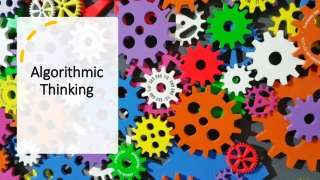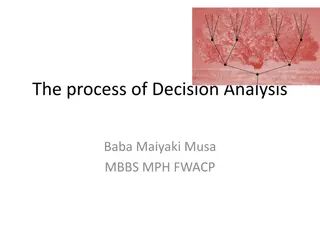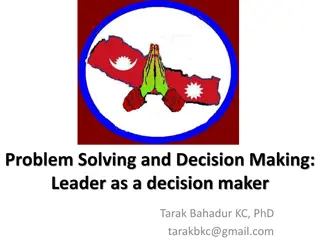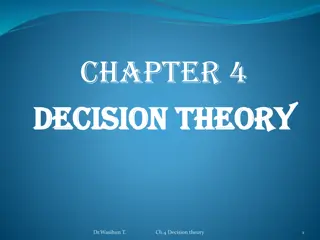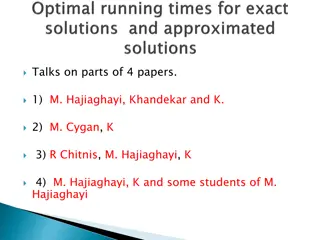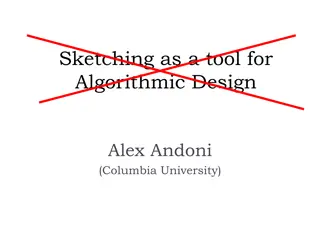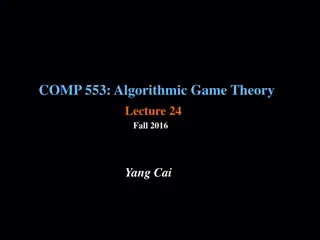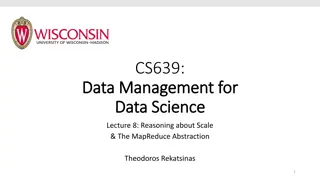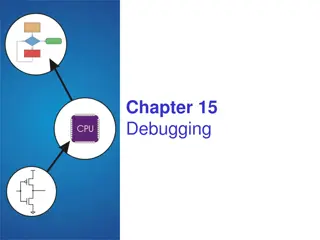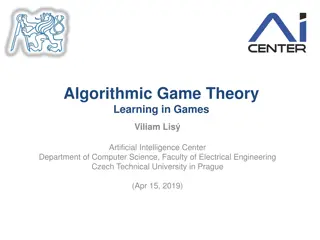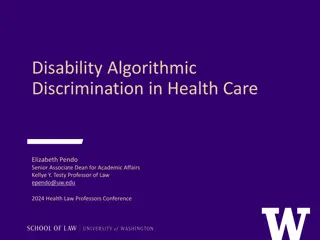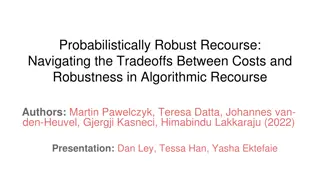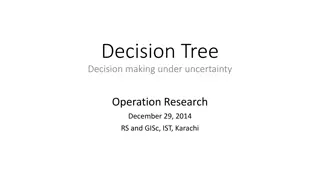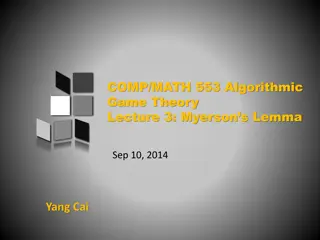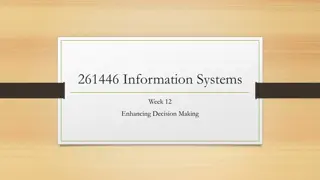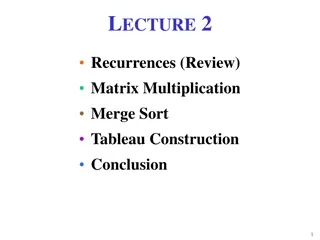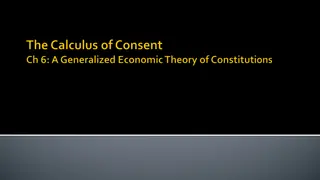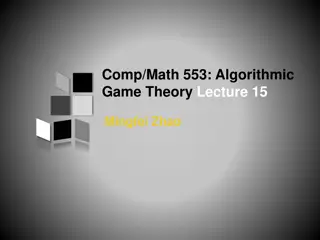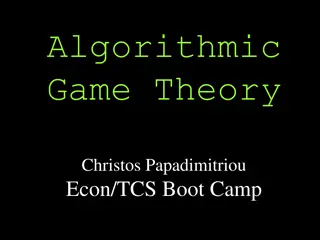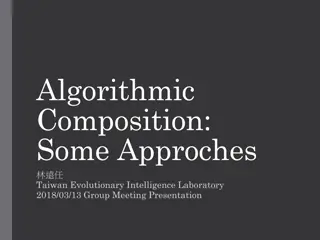Understanding Algorithmic Thinking: Key Concepts and Importance
Algorithmic thinking is a crucial skill that involves problem-solving through precisely defined instructions. This competency, applicable beyond computing, entails analyzing problems, identifying steps to solve them, and designing efficient algorithms. The importance of algorithmic thinking lies in
1 views • 13 slides
Understanding Brain Development and Decision-Making Skills
Explore the fascinating realm of brain development and decision-making skills, focusing on how different brain regions activate during decision-making, the evolution of decision-making abilities from adolescence to adulthood, the importance of practicing decision-making skills, and the influence of
6 views • 10 slides
Making Informed Decisions in Environmental Science
Values play a crucial role in environmental decision-making. Scientific research is essential in addressing environmental issues, but understanding values is necessary before research can begin. This article discusses how values impact environmental decision-making and introduces an environmental de
0 views • 22 slides
Enhancing Career Decision Making Process
Explore the importance of good decision-making, types of decision makers, problems faced in decision making, readiness factors for career decisions, decision-making processes, and the CASVE cycle. Understand the significance of effective decision-making skills and how they impact our lives.
0 views • 26 slides
HotFuzz: Discovering Algorithmic Denial-of-Service Vulnerabilities
A detailed exploration of algorithmic complexity bugs and insight into distributed micro-fuzzing methods. The study uncovers vulnerabilities through guided micro-fuzzing approaches, emphasizing the importance of AC bug detection and fuzz testing techniques such as seed inputs, fuzz observations, and
0 views • 14 slides
Understanding Decision Analysis in Work-related Scenarios
Decision analysis plays a crucial role in work-related decision-making processes, helping in identifying decision makers, exploring potential actions, evaluating outcomes, and considering various values involved in the decision. This module delves into the steps involved in decision analysis, provid
0 views • 76 slides
Understanding the Right to an Explanation in GDPR and AI Decision Making
The paper delves into the necessity for Explainable AI driven by regulations such as the GDPR, which mandates explanations for algorithmic decisions. It discusses the debate surrounding the existence of a legally binding right to explanation and the complexities of accommodating algorithmic machines
0 views • 22 slides
Comprehensive Guide to Decision Making and Creative Thinking in Management
Explore the rational model of decision-making, ways individuals and groups make compromises, guidelines for effective decision-making and creative thinking, utilizing probability theory and decision trees, advantages of group decision-making, and strategies to overcome creativity barriers. Understan
0 views • 30 slides
Mastering the Art of Decision Making: Problem Solving Strategies
Explore the essence of decision making and problem-solving through a comprehensive session outline. Understand the importance, conditions, styles, processes, and ethical considerations in decision making. Learn how identifying problems, finding solutions, and implementing them are crucial steps in t
0 views • 42 slides
Evolution of Algorithms and Computer Science Through History
The history of algorithms and algorithmic thinking dates back to ancient times, with the development of general-purpose computational machines by Charles Babbage in the 19th century marking a significant advancement. The term "computer science" emerged in 1959, encompassing theoretical computer scie
1 views • 39 slides
Understanding the Decision-Making Process
Decision-making is the process of selecting the best course of action from multiple alternatives to achieve desired outcomes. It involves identifying decisions, gathering relevant information, and following a step-by-step process to make informed choices. Principles and steps like identifying the de
0 views • 31 slides
Computational Thinking, Algorithms & Programming Overview
This unit covers key concepts in computational thinking, including decomposition, abstraction, and algorithmic thinking. Decomposition involves breaking down complex problems, abstraction focuses on identifying essential elements, and algorithmic thinking is about defining clear instructions to solv
1 views • 5 slides
Introduction to Decision Theory in Business Environments
Decision theory plays a crucial role in business decision-making under conditions of uncertainty. This chapter explores the key characteristics of decision theory, including alternatives, states of nature, payoffs, degree of certainty, and decision criteria. It also introduces the concept of payoff
0 views • 41 slides
Understanding Decision Trees in Machine Learning with AIMA and WEKA
Decision trees are an essential concept in machine learning, enabling efficient data classification. The provided content discusses decision trees in the context of the AIMA and WEKA libraries, showcasing how to build and train decision tree models using Python. Through a dataset from the UCI Machin
3 views • 19 slides
Understanding Algorithmic Thinking in Digital Systems
Explore the application of algorithmic thinking in digital systems through the journey of Mike Clapper, the Executive Director of AMT. Learn about recognizing patterns in data, creating algorithms to solve problems, and utilizing information systems creatively. Enhance your knowledge of digital syst
0 views • 56 slides
Insights into Advanced Algorithmic Problems
Delve into discussions surrounding complex algorithmic challenges, such as the limitations in solving the 3-SAT problem within specific time bounds, the Exponential Time Hypothesis, proving lower bounds for algorithms in various scenarios, and exploring approximation ratios in algorithm design. Thes
1 views • 65 slides
Sketching as a Tool for Algorithmic Design by Alex Andoni - Overview
Utilizing sketching in algorithmic design, Alex Andoni from Columbia University explores methodologies such as succinct efficient algorithms, dimension reduction, sampling, metric embeddings, and more. The approach involves numerical linear algebra, similarity search, and geometric min-cost matching
0 views • 18 slides
Should Assisted Suicide be Legalized in China? Decision-making with Six Thinking Hats
The content discusses the decision-making process using the Six Thinking Hats method to determine whether assisted suicide should be legalized in China. Various tools and sessions are highlighted, guiding participants through considering different viewpoints, analyzing arguments, and making an infor
0 views • 12 slides
Algorithmic Issues in Tracking: A Deep Dive into Mean Shift, EM, and Line Fitting
Delve into algorithmic challenges in tracking tasks, exploring techniques like mean shift, Expectation-Maximization (EM), and line fitting. Understand the complexities of differentiating outliers and inliers, with a focus on segregating points into best-fit line segments.
0 views • 44 slides
Understanding Greedy Algorithms in Algorithmic Design
Greedy algorithms in algorithmic design involve making the best choice at each step to tackle large, complex problems by breaking them into smaller sub-problems. While they provide efficient solutions for some problems, they may not always work, especially in scenarios like navigating one-way street
1 views • 9 slides
Enhancing Algorithmic Team Formation Through Stakeholder Engagement
Integrating stakeholder voices is crucial in algorithmic team formation to ensure a positive team experience, quality outcomes, and high performance. This research explores learner-centered approaches and considers various team formation methods, highlighting their strengths and weaknesses in educat
0 views • 37 slides
Understanding Brouwer's Fixed Point Theorem and Nash's Proof in Algorithmic Game Theory
Explore the foundational theorems of Brouwer and Nash in Algorithmic Game Theory. Dive into Brouwer's Fixed Point Theorem, showcasing the existence of fixed points in continuous functions. Delve into Nash's Proof, unveiling the Nash equilibrium in game theory. Discover visualizations and constructio
0 views • 23 slides
Understanding Scalability and Algorithmic Complexity in Data Management for Data Science
This lecture delves into the concept of scalability in data management for data science, covering operational and algorithmic aspects. It discusses the importance of efficient resource utilization, scaling out to multiple computing nodes, and managing algorithmic complexity for optimal performance i
0 views • 47 slides
The Assisted Decision-Making (Capacity) Act 2015 in the Criminal Justice Context
The Assisted Decision-Making (Capacity) Act 2015 introduces key reforms such as the abolition of wards of court system for adults, a statutory functional test of capacity, new guiding principles, a three-tier framework for support, and tools for advance planning. It emphasizes functional assessment
0 views • 17 slides
Proposal for Directive to Enhance Working Conditions in Platform Work
The proposal aims to address challenges in platform work, including employment status classification and algorithmic management issues. It seeks to improve transparency, fairness, and accountability in algorithmic decision-making, correctly determine employment status, enhance transparency in platfo
0 views • 13 slides
Implementing Group Decision-Making Tools with Voting Procedures at Toulouse E-Democracy Summer School
Decision-making in organizations is crucial, and group decision-making can lead to conflicts due to differing views. Group Decision Support Systems (GDSS) are essential for facilitating decision-making processes. The Toulouse E-Democracy Summer School discusses the implementation of voting tools in
0 views • 21 slides
Understanding Debugging in High-Level Languages
Debugging in high-level languages involves examining and setting values in memory, executing portions of the program, and stopping execution as needed. Different types of errors – syntactic, semantic, and algorithmic – require specific debugging approaches. Syntactic errors are related to code l
0 views • 9 slides
Decision Analysis: Problem Formulation, Decision Making, and Risk Analysis
Decision analysis involves problem formulation, decision making with and without probabilities, risk analysis, and sensitivity analysis. It includes defining decision alternatives, states of nature, and payoffs, creating payoff tables, decision trees, and using different decision-making criteria. Wi
0 views • 27 slides
Algorithmic Game Theory Learning in Games by Viliam Lis
The content discusses the concept of algorithmic game theory learning in games, covering topics such as online learning, prediction, best response dynamics, and convergence to Nash equilibrium. It explores how simple learning agents achieve equilibrium outcomes and the application of algorithms in v
0 views • 23 slides
Algorithmic Discrimination in Health Care: Protecting Vulnerable Patients
Elizabeth Pendo and Jennifer D. Oliva discuss disability discrimination in health care algorithms, advocating for legal protections under Section 504, ADA, and ACA. Their article proposes strategies to combat algorithmic bias and enhance antidiscrimination efforts in the 2024 Section 1557 final rule
0 views • 13 slides
Understanding Fairness and Tradeoffs in Machine Learning
Explore the concept of fairness in machine learning models and how biases can impact decision-making processes. Delve into various sources of bias and frameworks for understanding unintended consequences. Using college admissions as an example, discover different approaches to achieving group fairne
0 views • 32 slides
Navigating Tradeoffs in Algorithmic Recourse: A Probabilistic Approach
This paper introduces PROBE, a Probabilistically Robust Recourse framework allowing users to balance cost and robustness in algorithmic recourse. Users can choose the recourse invalidation rate, enabling more tailored and efficient recourse management compared to existing methods. PROBE enhances cos
0 views • 17 slides
Decision Making Under Uncertainty Using Decision Trees
In this scenario, Colaco faces the decision of whether to conduct a market study for their product, Chocola. The decision involves potential national success or failure outcomes, along with the consequences of a local success or failure from the market study. By utilizing decision trees, this comple
10 views • 7 slides
Understanding Myerson's Lemma in Algorithmic Game Theory
Myerson's Lemma is a fundamental concept in algorithmic game theory, particularly in the context of Sponsored Search Auctions. This lecture delves into the application of Myerson's Lemma to ensure truthful bidding as a dominant strategy, maximize social welfare, and maintain polynomial running time
0 views • 19 slides
Enhancing Decision Making with Information Systems
Explore the role of information systems in enhancing decision-making processes within organizations. Topics include business intelligence, types of decisions, decision-making processes, and managerial roles. Learn about structured, unstructured, and semi-structured decisions, different models of man
0 views • 21 slides
Understanding Algorithmic Complexity Measures and the Master Method
In this study, we explore key concepts in algorithmic complexity, including recurrences, matrix multiplication, merge sort, and tableau construction. We delve into the Master Method for solving recurrences, examining Cases 1, 2, and 3, and providing solutions for each scenario. Additionally, we disc
0 views • 61 slides
Decision Making and Constitutional Rules Behind the Veil of Ignorance
In decision-making for collective actions, individuals behind a veil of ignorance need constitutional rules to govern future decisions. The choice of rules, the expected external costs, and decision-making costs play a crucial role in determining the optimal decision-making rule. By minimizing total
0 views • 16 slides
Algorithmic Game Theory Lecture on Prophet Inequality and Auction Design
In this lecture on Algorithmic Game Theory, Mingfei Zhao discusses the Prophet Inequality and its application to single-item auctions. The lecture covers the concept of Prophet Inequality, strategies to guarantee expected payoffs, and different auction designs such as the Bulow-Klemperer Theorem and
0 views • 10 slides
Evolution of Algorithmic Game Theory in Computer Science
The evolution of Algorithmic Game Theory (AGT) in the realm of Computer Science showcases the intersection of economics and theoretical computation. Before 1995, notable researchers like von Neumann and Megiddo laid the foundation for AGT. Concepts such as computation as a game, bounded rationality,
0 views • 62 slides
Exploring Algorithmic Composition Techniques in Music Generation
Algorithmic composition involves the use of algorithms to create music, mimicking human composers by generating music based on specific rules and structures. This presentation delves into various approaches such as DeepBach, MuseGAN, and EMI, highlighting the use of evolutionary algorithms, machine
0 views • 35 slides
